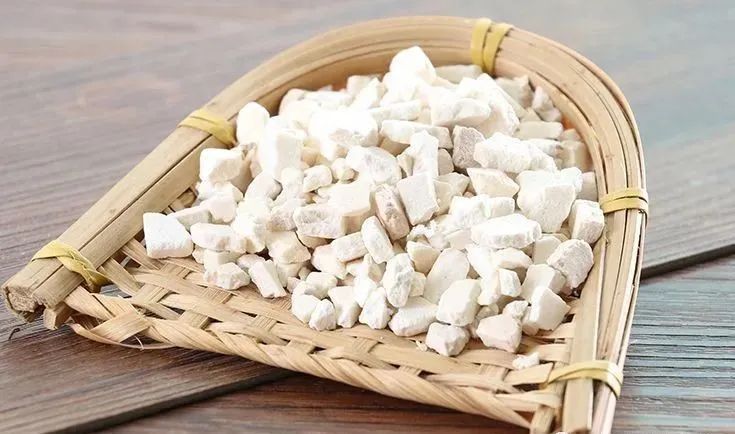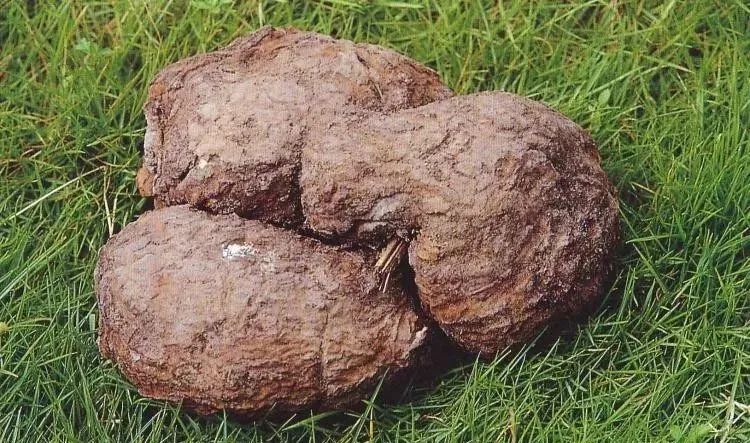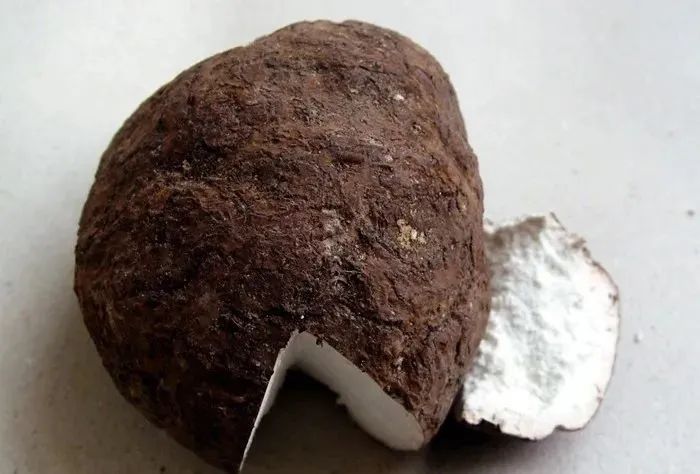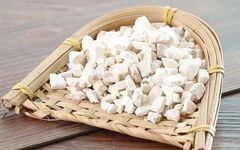Disease Inquiry, Health Guidance, Classic Health Preservation, Traditional Chinese Medicine and Herbal Medicine, No Need to Seek Help When Sick
PinyinFú Línɡ

Alias Fú Tū (《Bencao Jing》), Fú Línɡ (《Shiji》), Fú Lín (《Guangya》), Fú Línɡ, Fú Tū (《Tang Bencao》), Sōng Yú (《Jishi Zhu》), Jiàng Chén Fú Tái (《Youyang Zazhu》), Yún Lín (《Dianhai Yuheng Zhi》), Fú Tù (《Gangmu》), Sōng Shǔ, Sōng Mù Shǔ, Sōng Lín (《Guangxi Zhongyao Zhi》).
Source《Bencao Jing》
Origin The dried sclerotium of the fungus Poria cocos, belonging to the family Polyporaceae. Wild Poria is generally harvested from July to March of the following year in pine forests.
The ground where Poria grows typically has the following characteristics: (1) Cracks around the stumps in the pine forest that produce a hollow sound when struck; (2) White mycelium (appearing as a powdery white membrane or powdery gray) on the ground near pine trees; (3) Black-red horizontal cracks on the stump after decay; (4) The ground around the stump dries quickly after light rain, or there are areas where grass does not grow. Cultivated Poria is usually harvested in the second or third year after inoculation, with the best quality harvested after the beginning of autumn; harvesting too early affects quality and yield. Processing: After harvesting, Poria is cleaned of soil, piled in a corner of the house where there is no ventilation, or stored in a ceramic jar, with a layer of pine needles or straw laid at the bottom, and Poria layered with straw, covered with thick burlap to allow it to “sweat” and release moisture. It is then taken out, water droplets wiped off, spread in a cool place, and allowed to dry on the surface before sweating again. This process is repeated 3-4 times until the surface shrinks, the skin color turns brown, and it is then placed in a cool, dry place to dry completely, resulting in “Poria Ge”. Cutting: After sweating, it is cut while moist, or dried Poria can be soaked in water before cutting. The white part inside the Poria sclerotium is cut into thin slices or small cubes, known as Bai Fú Lín (White Poria); the black outer skin that is shaved off is known as Fú Lín Pí (Poria Skin); the red part beneath the Poria skin is known as Chì Fú Lín (Red Poria); the white part with pine roots, cut into square thin slices, is known as Fú Shén (Spirit of Poria). All processed products must be dried in the shade, not exposed to heat or sunlight, and should be kept in a cool place to avoid losing stickiness or cracking.
The common form is its sclerotium, which is usually irregularly shaped, spherical, flat, elongated, or oval, varying in size from as small as a fist to a diameter of 20-30 cm or larger. The surface is light gray-brown or black-brown, with a lumpy, wrinkled appearance, and the interior is white with a slight pink hue, composed of countless mycelia. The fruiting body is umbrella-shaped, with a diameter of 0.5-2 mm, and the mouth edge is slightly serrated; the sexual generation is rarely seen, honeycomb-like, usually growing attached to the outer skin of the sclerotium, initially white, gradually turning light brown, with holes that are polygonal, and the basidia are rod-shaped, with basidiospores that are oval to cylindrical, slightly curved, one end pointed, smooth, and colorless. It has a distinctive odor.

Habitat Distribution It parasitizes the roots of pine family plants such as red pine or Masson pine, penetrating 20-30 cm underground. It is distributed in Hebei, Henan, Shandong, Anhui, Zhejiang, Fujian, Guangdong, Guangxi, Hunan, Hubei, Sichuan, Guizhou, Yunnan, Shanxi, and other regions.
Characteristics Poria Ge is spherical, flat, or irregularly shaped, varying in size and weight from several taels to over ten jin. The surface is black-brown or brown, with a thin and rough outer skin, and prominent wrinkled patterns, often covered with soil. It is heavy, hard, and not easily broken; the cross-section is uneven, granular or powdery, with the outer layer being light brown or light red, and the inner layer entirely white, with a few being light brown, fine, and may show cracks or brown pine roots embedded in white fluffy fragments. It has no odor and is sticky when chewed. The best quality is firm, with a brownish outer skin that has a slight sheen, deep wrinkles, a fine white cross-section, and strong stickiness. Bai Fú Lín is cut into thin slices or cubes, white, fine, and has a powdery smooth feel. It is loose and brittle, easily broken, and sometimes the edges appear yellow-brown.

Chemical Composition The sclerotium contains β-Poria polysaccharides, accounting for about 93% of the dry weight, and triterpenoid compounds such as acetyl poria acid, poria acid, and 3β-hydroxy lanosterol acid. Additionally, it contains gum, chitin, protein, fat, sterols, lecithin, glucose, adenine, histidine, choline, β-Poria polysaccharide-decomposing enzymes, lipase, protease, etc.
Pharmacological Effects ① Diuretic Effect
Wǔ Línɡ Sǎn shows significant diuretic effects in chronic ureteral fistula dogs (intravenous injection), healthy individuals, and rabbits (oral decoction), with increased excretion of sodium, potassium, and chloride in dogs. However, the main diuretic ingredients in Wǔ Línɡ Sǎn are Guì Zhī (Cinnamon Twig), Zé Xiè (Alisma), and Bái Zhú (Atractylodes). It has also been reported that the decoction of Wǔ Línɡ Sǎn given orally to rats at a dose of 1 gram/100 grams did not demonstrate a diuretic effect.
② Antibacterial Effect
In vitro, no antibacterial effect of Poria was found. The ethanol extract can kill Leptospira, while the water decoction is ineffective.
③ Effects on the Digestive System
Poria has a direct relaxing effect on isolated intestinal segments of rabbits and can prevent ulcers formed by pyloric ligation in rats, as well as reduce gastric acid.
④ Other Effects
Poria can lower blood sugar, and tinctures and infusions can inhibit the isolated heart of toads, while ether or ethanol extracts can strengthen heart contractions. It does not have an antiemetic effect on vomiting induced by digitalis.
Preparation Poria: Soak in water, wash, drain, steam, slice, and dry. Zhu Fú Lín: Take Poria blocks, spray with clean water, slightly moisten, and evenly sprinkle with fine vermilion powder, repeatedly turning to coat the surface with the powder, then dry. (For every 100 jin of Poria, use 30 taels of vermilion powder.)
Nature and Flavor Sweet and bland, neutral.
①《Bencao Jing》: “Taste sweet, neutral.”
②《Yixue Qiyuan》: “The ‘Main Treatment Secrets’ states it is warm in nature and bland in taste.”
It enters the Heart, Spleen, and Lung meridians.
①《Tangye Bencao》: “Enters the Hand Taiyin, Foot Yangming, and Shaoyang meridians.”
②《Bencao Mengquan》: “Enters the Bladder, Kidney, and Lung.”
③《Leigong Paozhi Yao Xing Jie》: “Enters the Lung, Spleen, and Small Intestine meridians.”
④《Bencao Jing Shu》: “Enters the Hand and Foot Shaoyin, Hand Taiyang, Foot Taiyin, and Yangming meridians.”
Main Functions and Indications Promotes diuresis and relieves edema, benefits the Spleen and harmonizes the Stomach, calms the mind and settles the spirit. Treats difficult urination, edema and fullness, phlegm and cough, nausea, diarrhea, nocturnal emissions, turbid urination, palpitations, and forgetfulness.
①《Bencao Jing》: “Mainly treats chest and flank counterflow qi, worry and fright, heart pain, cold and heat fullness, cough, dry mouth and tongue, and promotes urination.”
②《Bielu》: “Stops thirst, promotes sleep, abdominal fullness, turbid urination, phlegm and water in the diaphragm, edema and urinary obstruction. Opens the chest, regulates organ qi, expels kidney evil, nourishes yin, boosts energy, and protects the spirit.”
③《Yaoxing Lun》: “Opens the appetite, stops nausea, and is good for calming the spirit. Treats lung atrophy and phlegm obstruction. Treats childhood convulsions, abdominal distension, and women’s heat urination.”
④《Rihua Zibencao》: “Nourishes the five labors and seven injuries, calms the fetus, warms the lower back and knees, opens the mind and benefits intelligence, and stops forgetfulness.”
⑤《Shanghan Ming Lixue》: “Promotes diuresis and relieves the Spleen.”
⑥《Yixue Qiyuan》: “Removes dampness, benefits blood between the waist and navel, harmonizes the middle and boosts energy as the main function. Treats yellow or red urination that is difficult. ‘Main Treatment Secrets’ states it stops diarrhea, removes deficiency heat, opens pores, and generates body fluids.”
⑦ Wang Haogu: “Expels from the bladder, benefits the Spleen and Stomach. Treats kidney accumulation and running piglet syndrome.”
⑧《Yao Zheng》: “Mainly treats palpitations and muscle spasms, and secondarily treats dizziness and irritability.”
Dosage and Administration Internal use: Decoction, 3-5 qian; or in pills or powders.
Precautions Avoid use in cases of deficiency cold, slippery essence, or qi deficiency with sinking.
①《Bencao Jing Jizhu》: “Ma Lin is used as a guide. Avoid white astringents. Avoid Mu Meng, Dihuang, Xionghuang, Qinjiao, and turtle shell.”
②《Yaoxing Lun》: “Avoid rice vinegar.”
③ Zhang Yuansu: “If there is slight convenience or frequency, taking it will harm the eyes. If taken during excessive sweating, it will harm the original qi.”
④《Bencao Jing Shu》: “Patients with kidney deficiency, frequent urination, or slippery essence should not take it.”
⑤《Depei Bencao》: “Qi deficiency with sinking, water dryness, and dry mouth are all contraindicated.”
Formulas ① For Taiyang disease, after sweating, with profuse sweating, dryness in the stomach, restlessness, and difficulty sleeping, pulse floating, and difficult urination with slight heat and thirst: 18 zhu of Zhu Ling (peeled), 1.6 liang of Zé Xiè, 18 zhu of Bái Zhú, 18 zhu of Fú Línɡ, and 0.5 liang of Guì Zhī (peeled). Mix the five ingredients, pound into a powder, and take with white drink, 1 tablespoon three times a day. (《Shanghan Lun》Wǔ Línɡ Sǎn)
② For frequent urination, slippery and frequent: Bai Fú Lín (remove black skin), dried Shan Yao (peeled, soaked in alum water, and dried over low heat). Mix the two ingredients in equal parts into a fine powder, and take with thin rice drink. (《Rumen Shiqin》)
③ For edema: 2 qian of clean water, 3 qian of Fú Línɡ, and 1.5 qian of Yù Lǐ Rén (crushed). Add ginger juice and decoct. (《Buzhi Yiyao》Fú Lín Soup)
④ For skin edema, swelling of the limbs, and water qi in the skin, with limbs feeling heavy: 3 liang of Fáng Jǐ, 3 liang of Huáng Qí, 3 liang of Guì Zhī, 6 liang of Fú Línɡ, and 2 liang of Gān Cǎo. Mix the five ingredients, boil with 6 sheng of water to obtain 2 sheng, and divide into three warm doses. (《Jinkui Yaolüe》Fáng Jǐ Fú Lín Soup)
⑤ For phlegm and water in the heart, fullness in the chest and flanks, and dizziness: 4 liang of Fú Línɡ, 3 liang each of Guì Zhī and Bái Zhú, and 2 liang of Gān Cǎo. Mix the four ingredients, boil with 6 sheng of water to obtain 3 sheng, and divide into three warm doses; urination will be smooth. (《Jinkui Yaolüe》Lín Guì Zhú Gān Soup)
⑥ For sudden vomiting, fullness in the heart, water in the diaphragm, and dizziness: 1 sheng of Bàn Xià, 0.5 jin of fresh ginger, and 3 liang of Fú Línɡ (or 4 liang). Mix the three ingredients, boil with 7 sheng of water to obtain 1.5 sheng, and take warm again. (《Jinkui Yaolüe》Xiǎo Bàn Xià Jiā Fú Lín Soup)
⑦ For persistent diarrhea: 2 liang of Bai Fú Lín, and 0.5 liang of Nán Mù Xiāng (wrapped in paper and roasted). Mix the two ingredients into a fine powder, and take with Zǐ Sū Mù Guǒ soup. (《Bai Yi Xuán Fāng》)
⑧ For damp diarrhea: 1 liang of Bái Zhú, and 7.5 qian of Fú Línɡ (remove skin). Finely chop, decoct 1 liang, and take before meals. (《Yuán Bìng Shì》Huo Lín Soup)
⑨ For gastric reflux and thirst, desiring to drink water: 0.5 jin of Fú Línɡ, 4 liang of Zé Xiè, 2 liang of Gān Cǎo, 2 liang of Guì Zhī, 3 liang of Bái Zhú, and 4 liang of fresh ginger. Mix the six ingredients, boil with 10 sheng of water to obtain 3 sheng, then add Zé Xiè and boil again to obtain 2.5 sheng, take warm 8 ounces, three times a day. (《Jinkui Yaolüe》Fú Lín Zé Xiè Soup)
⑩ For men with deficiency of original yang, weak essence, frequent leakage, cloudy urination, frequent nocturnal emissions, and for women with prolonged cold in the blood sea, white discharge, and constant dampness in the lower body, with urination resembling rice wash, or infertility: 4 liang of yellow wax, and 4 liang of Bai Fú Lín (remove skin, cut into pieces, and boil with 1 fen of Zhu Ling in porcelain for over twenty boils, then dry, without Zhu Ling). Mix into a powder, melt the yellow wax into balls the size of a wutong seed. Chew slowly on an empty stomach until saliva fills the mouth, then swallow gradually, using clear urination as a measure. (《Jufang》Wēi Xǐ Wán)
⑪ For heart deficiency and dream leakage, or cloudy urination: 2 qian of Bai Fú Lín powder. Take with rice soup, twice a day. (《Renzhai Zhizhi Fang》)
⑫ For heart sweat, with no sweat elsewhere, only sweating at the heart hole, and excessive sweating due to worry: Take Fú Lín powder with mugwort soup. (《Zheng Zhi Yao Jue》)
⑬ For lower deficiency and thirst, upper excess and lower deficiency, heart fire blazing, kidney water dried up, unable to interact, leading to thirst: 1 jin of Bai Fú Línɡ, and 1 jin of Huáng Lián. Grind into a powder, boil with tianhua fen to make a paste, and form balls the size of wutong seeds. Take 50 balls with warm soup. (《Desheng Tang Experience Formula》)
⑭ For head wind and dizziness, warming the lower back and knees, and treating the five labors and seven injuries: Mix Fú Lín powder with rice wine. (《Gangmu》Fú Lín Wine)
⑮ For skin diseases: Mix white honey with Fú Lín and apply, leave for seven days. (《Bǔ Quē Zhǒu Hòu Fāng》)
Various Discussions ① Tao Hongjing: “Fú Lín, the white one nourishes, the red one drains.”
②《Bencao Yanyi》: “Fú Lín and Fú Shén have a strong diuretic effect, and benefit the heart and spleen, which cannot be neglected.”
③《Yong Yao Xinfang》: “Fú Lín, bland can open the orifices, sweet can assist yang, is the holy medicine for removing dampness. Its sweet and neutral nature nourishes yang, benefits the spleen, expels water, generates fluids, and guides qi.”
④《Tangye Bencao》: “Fú Lín can expel kidney evil, frequent urination can be stopped, and difficult urination can be relieved. When used with wine and bright vermilion, it can conceal the true essence.”
⑤《Bencao Yanyi Bǔ Yì》: “Fú Lín is often used by Zhongjing for frequent urination, this is the key medicine for treating acute new diseases, but if there is yin deficiency, it may not be suitable.”
⑥《Gangmu》: “Fú Lín, according to the Bencao, also states that it promotes urination, expels kidney evil, and in Dongyuan and Wang Haizang, it is said that frequent urination can be stopped, and difficult urination can be relieved. It is similar to vermilion, which can conceal the true essence. However, Zhu Danxi also states that it is not suitable for yin deficiency, which seems contradictory. Why? Fú Lín is bland and permeates, its nature ascends, generates fluids, opens the orifices, nourishes the water source and descends, promotes urination, hence Zhang Juegu said it belongs to yang, floating and ascending, referring to its nature; Dongyuan said it is yin among yang, descending and lowering, referring to its function. The Suwen states that food enters the stomach, overflows the essence qi, ascends to the lungs, regulates the water pathways, and descends to the bladder. From this, it is known that bland and permeating medicines all ascend before descending, not just descending. Frequent urination has different sources. The Suwen states that abundant lung qi leads to frequent urination and deficiency leads to cough and frequent urination. Heart deficiency leads to less qi and frequent urination, and deficiency in the lower jiao leads to frequent urination. Heat in the bladder leads to frequent urination, while bladder obstruction leads to retention. The so-called abundant lung qi is actually heat, and such a person must have strong qi and pulse, suitable for using Fú Lín, which is sweet and bland to drain heat, hence it is said that frequent urination can be stopped. However, for lung deficiency, heart deficiency, bladder heat, and other conditions, they are all deficiency heat, and such a person must have upper heat and lower cold, weak pulse, and should use warming medicines to strongly tonify the lower jiao, hence both conditions cannot be treated with bland and permeating medicines like Fú Lín, thus it is said that yin deficiency is not suitable for use.”
⑦《Bencao Jing Shu》: “Fú Lín, its taste is sweet and neutral, its nature is non-toxic, entering the hand and foot Shaoyin, hand Yangming, foot Taiyin, and Yangming meridians, it is yin among yang. Chest and flank counterflow qi, evil in the hand Shaoyin; worry and fright, all due to insufficient heart qi; palpitations due to insufficient kidney will; heart pain, cold and heat fullness, cough, dry mouth and tongue, are all due to evil in the hand Shaoyin. Sweet can tonify the middle, bland and can open the orifices, tonifying the middle makes the heart and spleen full, opening the orifices resolves evil heat, making the heart and spleen full stops worry and fright, resolving evil heat makes heart pain, cold and heat fullness, cough, dry mouth and tongue self-resolve. The middle jiao receives damp heat, leading to thirst, dampness in the spleen, weak spleen qi leads to good sleep, abdominal fullness occurs when the spleen is deficient and cannot drain water, hence abdominal distension occurs. Turbid urination occurs when the spleen receives damp evil, leading to urinary obstruction. Phlegm and water in the diaphragm and edema are all due to spleen deficiency. The middle jiao is where the spleen is treated, and if the middle jiao is not treated, these diseases will appear. Promoting diuresis and tonifying the spleen will resolve these symptoms. Opening the chest, regulating organ qi, and expelling kidney evil are all functions of promoting water and removing dampness, resolving heat and dispersing masses. The white one enters the qi aspect, the red one enters the blood aspect, tonifying the heart and benefiting the spleen, white is superior to red, promoting the small intestine, specifically removing damp heat, red also surpasses white.”
⑧《Bencao Zheng》: “Fú Lín can open the orifices and remove dampness, opening the orifices can calm the mind and benefit intelligence, removing dampness can expel water and dry the spleen, tonifying the middle and strengthening the stomach; dispelling fright and convulsions, thickening the intestines, treating the root of phlegm, and assisting the descending of medicines. Its taste is slightly sweet, hence it is said to tonify yang. However, tonifying is less effective than draining, hence excessive use can harm the eyes, and prolonged weakness is extremely unsuitable. If mixed with human milk and dried, the milk powder is abundant, tonifying yin is also excellent.”
⑨《Yao Pin Hua Yi》: “Bai Fú Lín, its taste is uniquely sweet and bland, sweet can tonify, bland can drain, sweet and bland belong to earth, used to tonify spleen yin, earth is strong and generates metal, also benefits lung qi. It mainly treats disharmony of the spleen and stomach, diarrhea and abdominal distension, chest and flank counterflow qi, worry and fullness, insufficient fetal qi, soul and spirit jumping, phlegm and qi in the diaphragm. Sweet tonifies, hence the spleen benefits, when the middle qi is harmonious, body fluids are generated, dry mouth and tongue are relieved. It also treats lower damp heat, turbid urination, and edema. Yellow or red urination, and kidney discomfort, lead to retention of evil water. Hence, bland drainage nourishes the bladder, and strong kidney qi leads to blood flow in the waist and navel, allowing body fluids to circulate, benefiting the lung from the upper source, tonifying the spleen from the middle, allowing the qi of the spleen and lung to flow from above to below, regulating the water pathways to nourish the bladder, hence frequent urination can be stopped, and difficult urination can be relieved.”
⑩《Bencao Qiuzhen》: “Fú Lín enters the Four Gentlemen, assisting Ren and Zhú to drain the dampness of the spleen, entering the Six Flavors, allowing Zé Xiè to expel the remaining kidney evil, making it the key medicine for promoting water and removing dampness. The text states that tonifying the spleen means that when water is removed, the spleen naturally becomes strong… When water is removed, frequent urination opens naturally, how can there be concerns about urinary obstruction? When water is removed, the chest and diaphragm widen, and pain and fullness do not occur; when water is removed, body fluids are generated, and dry mouth and tongue are all relieved.”
⑪《Bencao Jing Shu Zheng》: “Qi moistens and moves, water moves with qi, when water stagnates, qi is obstructed, and when qi is obstructed, water accumulates. Fú Lín is purely used for qi, hence its treatment is related to water. Observing Zhongjing’s text, it is evidently recognizable, such as following the obstruction of qi to promote water (Fú Lín Gān Cǎo Soup); following the water accumulation to transform qi (Wǔ Línɡ Sǎn); qi obstructed by water leads to the need to guide water down (Fú Lín Guì Zhī Gān Cǎo Dà Zǎo Soup, Fú Lín Guì Zhī Bái Zhú Gān Cǎo Soup); when water and qi are both obstructed above, it is necessary to drain from the side to prevent the loss of yang (Fáng Jǐ Fú Lín Soup); when qi is consumed externally, water is forced internally, hence it is the monarch in the tonic medicine (Fú Lín Sì Nì Soup); when qi is obstructed below, water stagnates, hence it is effective in pregnancy (Guì Zhī Fú Lín Wán, Kuí Zǐ Fú Lín Sǎn). All of these arise from yin following yang, spreading yang to transform yin, allowing the requesting party to be unblocked, and the turbid to naturally retreat, whether from below or from the outside, hence the purpose of Fú Lín is in tonifying rather than draining, and the use of Fú Lín is in draining rather than tonifying.”
Excerpt from the “Dictionary of Chinese Medicine”
Note: This article is for reference only; specific treatment and medication should follow medical advice! This public account is only for academic exchange.To learn more about Traditional Chinese Medicine, herbal materials, herbal recipes, and folk remedies, ▼ Click the card below ▼ to inquire!
For example: back pain, gynecology, andrology, kidney tonification, lumbar disc herniation, back pain, leg pain, knee pain, cervical spondylosis, liver disease, stomach disease, constipation, frequent urination, abdominal protrusion, dysmenorrhea, breast hyperplasia, postpartum care, acne, white hair, hair loss, skin diseases, age spots, aging, yin deficiency, cold, cough, fever, insomnia, stones, pharyngitis, sore throat, headache, toothache, snoring, oral ulcers, bad breath, rhinitis, tinnitus, eye diseases, thyroid issues, dandruff, athlete’s foot, hemorrhoids, cold hands and feet, rheumatism, night sweats, cerebral hemorrhage, hypertension, diabetes, asthma, heart disease, cardiovascular diseases, fatty liver, gout, Alzheimer’s disease, varicose veins, qi tonification, blood tonification, calcium tonification, weakness, obesity, childhood diseases, slim legs, slim waist, dampness, spleen tonification, hiccups, body odor, cramps, smoking cessation, meridians, Chinese patent medicines, foot baths… and more.
Thank you for sharing and clicking to view, may good fortune continue!

